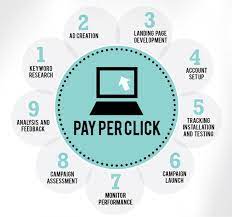The Power of Pay-Per-Click Management in Digital Marketing
In the fast-paced world of digital marketing, businesses are constantly seeking ways to reach their target audience effectively. One powerful tool that has proven to be instrumental in driving traffic and generating leads is pay-per-click (PPC) advertising.
PPC management involves the strategic oversight and optimization of paid advertising campaigns on search engines and other platforms. By carefully monitoring and adjusting various elements of a PPC campaign, businesses can maximize their return on investment and achieve specific marketing objectives.
Benefits of Effective PPC Management:
- Targeted Reach: With PPC, businesses can target specific demographics, locations, and interests, ensuring that their ads are seen by the right audience.
- Instant Visibility: Unlike organic methods, PPC ads provide instant visibility on search engine results pages, driving immediate traffic to a website.
- Measurable Results: PPC campaigns offer detailed analytics that allow businesses to track performance metrics such as click-through rates, conversions, and ROI.
- Cost Control: Through careful budget management and keyword selection, businesses can control costs and optimize their ad spend for maximum impact.
- Ongoing Optimization: A key aspect of PPC management is continuous optimization based on data analysis, ensuring that campaigns remain effective and competitive.
Key Strategies for Successful PPC Management:
To harness the full potential of PPC advertising, businesses should consider implementing the following strategies:
- Keyword Research: Conduct thorough keyword research to identify relevant terms that align with your business goals and target audience.
- Ad Copy Optimization: Craft compelling ad copy that entices users to click while accurately representing your products or services.
- Landing Page Optimization: Ensure that landing pages are optimized for conversions, providing a seamless user experience from ad click to desired action.
- Bid Management: Monitor bids closely to maintain a competitive position while maximizing ROI within budget constraints.
- A/B Testing: Test different ad creatives, landing pages, and targeting options to identify what resonates best with your audience.
In conclusion, pay-per-click management plays a vital role in modern digital marketing strategies by offering targeted reach, measurable results, and cost-effective advertising solutions. By implementing effective PPC management practices, businesses can drive quality traffic to their websites and achieve tangible business outcomes in today’s competitive online landscape.
Essential Insights into PPC Management: Understanding, Monitoring, and Maximizing Your Pay-Per-Click Strategies
- What does PPC stand for in management?
- How do I monitor pay-per-click?
- What is pay-per-click management?
- What does a PPC manager do?
What does PPC stand for in management?
In the realm of digital marketing, PPC stands for “pay-per-click.” This term refers to a form of online advertising where advertisers pay a fee each time their ad is clicked. PPC management involves overseeing and optimizing these paid advertising campaigns to ensure they effectively reach the target audience and drive desired actions, such as website visits or conversions. By strategically managing PPC campaigns, businesses can maximize their return on investment and achieve specific marketing objectives in a measurable and cost-effective manner.
How do I monitor pay-per-click?
Monitoring pay-per-click (PPC) campaigns is essential for evaluating their performance and optimizing results. To effectively monitor PPC, businesses can utilize various tools and metrics such as click-through rates, conversion rates, cost per click, and return on ad spend. By regularly analyzing these key indicators, businesses can track the effectiveness of their ads, identify areas for improvement, and make data-driven decisions to enhance campaign success. Additionally, setting up conversion tracking and implementing A/B testing can provide valuable insights into user behavior and help refine targeting strategies for better results in PPC management.
What is pay-per-click management?
Pay-per-click management refers to the strategic oversight and optimization of paid advertising campaigns, where businesses pay a fee each time their ad is clicked. This essential aspect of digital marketing involves meticulous monitoring and adjustment of various campaign elements to maximize ROI and achieve specific marketing objectives. Through targeted keyword selection, ad copy optimization, budget control, and continuous performance analysis, pay-per-click management aims to drive relevant traffic to a website while ensuring cost-effective results. By leveraging the power of pay-per-click management, businesses can enhance their online visibility, attract quality leads, and ultimately boost their overall digital marketing success.
What does a PPC manager do?
A PPC manager plays a crucial role in overseeing and optimizing pay-per-click advertising campaigns to achieve specific marketing objectives. Their responsibilities include conducting keyword research, creating and testing ad copy, monitoring campaign performance, adjusting bids for optimal results, analyzing data to make informed decisions, and collaborating with other team members to ensure a cohesive digital marketing strategy. Ultimately, a PPC manager’s expertise lies in strategically managing paid advertising efforts to drive targeted traffic, increase conversions, and maximize return on investment for businesses seeking to enhance their online presence.

